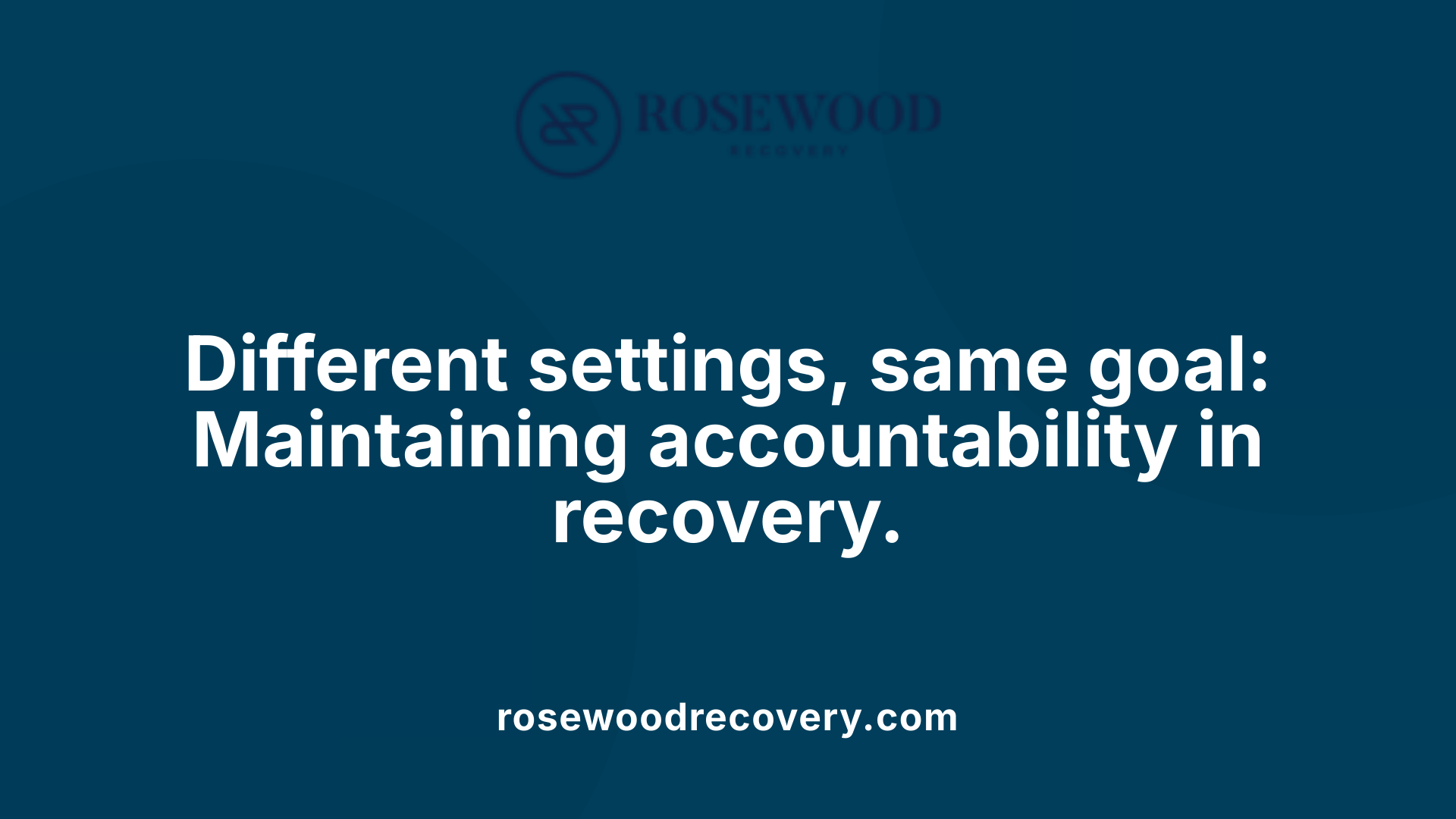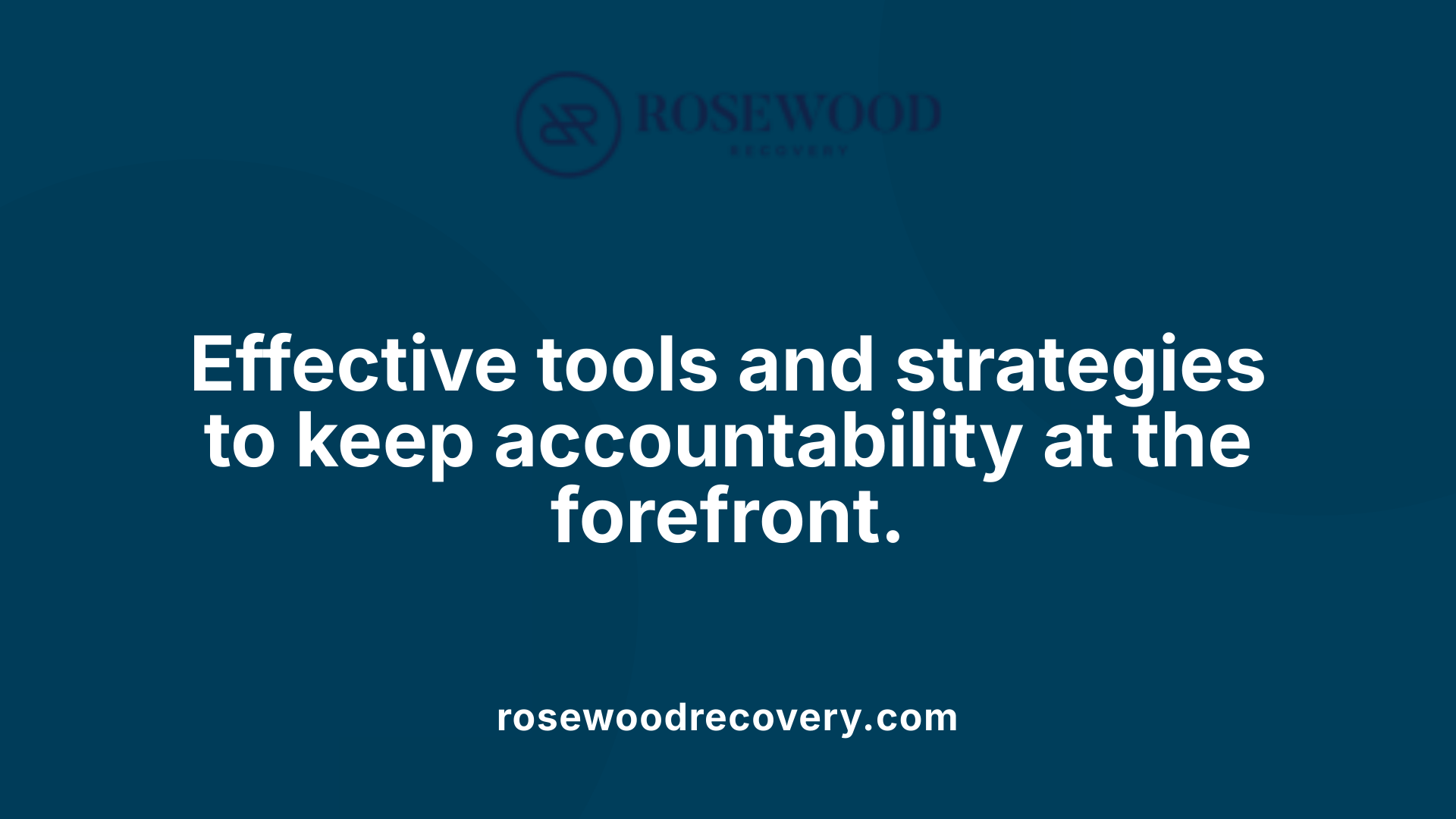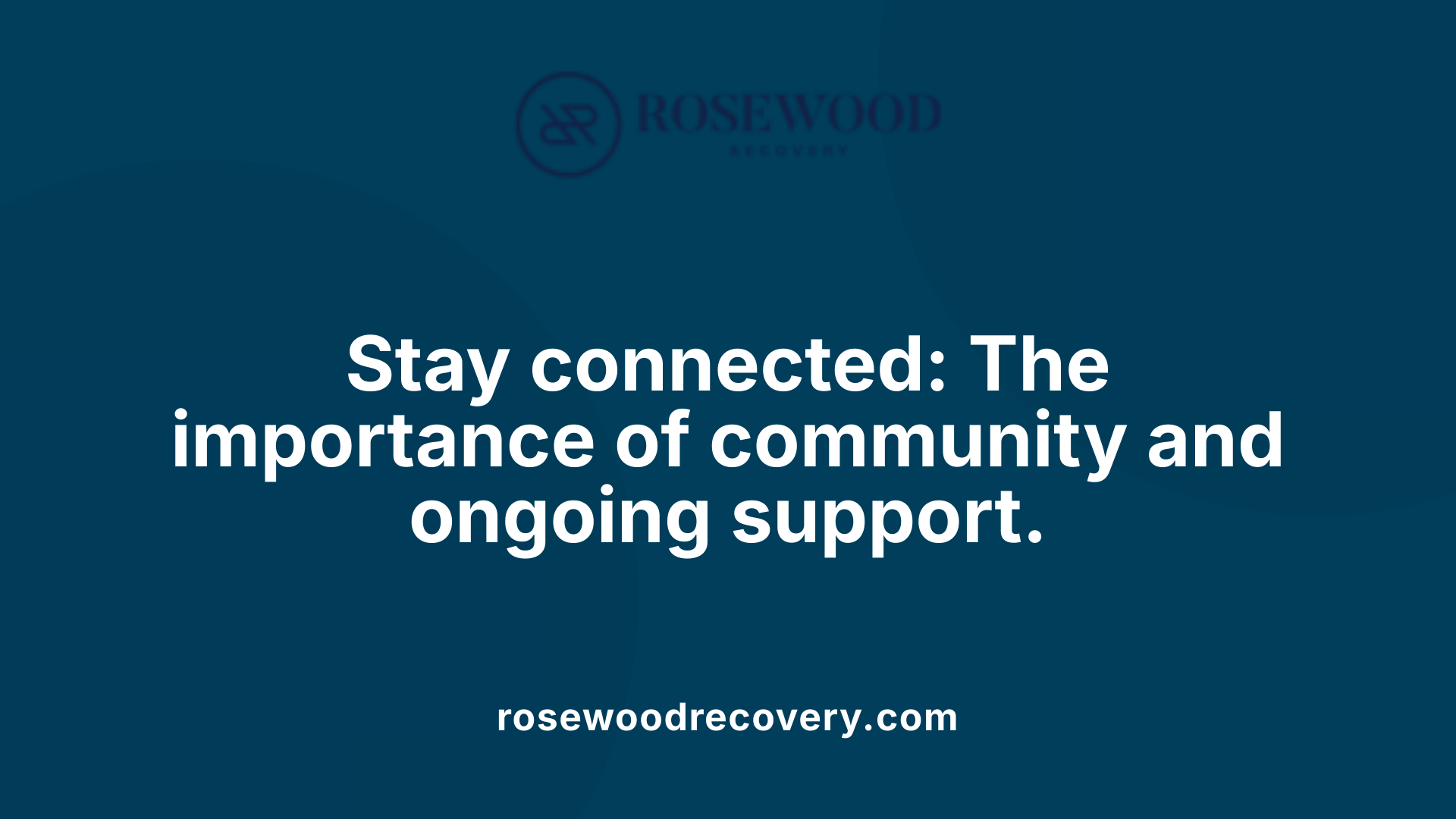Understanding Accountability in Addiction Recovery
Accountability is a fundamental element of effective addiction recovery, especially within General Outpatient Programs (GOP) in Pennsylvania. It involves taking personal responsibility for one's actions, maintaining honesty, and actively engaging in the recovery process. This article explores how accountability enhances recovery outcomes, the strategies for implementing it, and its vital role in supporting long-term sobriety.
The Role of Routine and Rules in Promoting Accountability

How does establishing a routine support recovery?
Establishing a routine plays a vital role in addiction recovery by providing consistency and structure that help individuals regain control over their lives. Routines create a predictable daily schedule, which reduces stress and uncertainty, making it easier to manage withdrawal symptoms and cravings. During detox and early recovery, consistent activities like therapy, exercise, and mindfulness practice foster emotional stability.
Having set routines also cultivates self-discipline and personal responsibility. As individuals adhere to daily habits—such as maintaining regular sleep, nutritious meals, and engaging in support meetings—they build healthy patterns that replace previous maladaptive behaviors. These habits strengthen self-awareness and accountability, essential for long-term sobriety.
Moreover, routines help minimize idle time, which is often associated with triggers for relapse. By staying occupied with purposeful activities, individuals develop positive coping skills and reinforce their commitment to recovery. In essence, a structured daily schedule supports emotional well-being, enhances physical health, and sustains motivation, all contributing to lasting recovery.
Why are rules important in recovery programs?
Rules within recovery programs serve as foundational elements to create a safe, supportive, and focused environment. They are designed to minimize risks and distractions, enabling patients to concentrate fully on their healing process. For example, prohibitions against cell phone use or romantic relationships prevent situations that could lead to relapse or emotional distress.
Safety is further ensured through specific policies like drug-free facilities, confidentiality agreements, and security measures, which foster trust and a sense of safety among participants. These guidelines help maintain order and promote respectful interactions, reducing conflicts and misunderstandings.
Strict rules also act as safeguards against self-harm and unethical behaviors, ensuring the integrity of the treatment environment. They promote accountability by clearly defining expectations and responsibilities, encouraging individuals to adhere to healthy boundaries and behaviors.
Ultimately, well-designed rules uphold the effectiveness of recovery programs, support personal growth, and build a cohesive community environment where individuals can focus on their journey to sustained sobriety.
| Aspect | Role in Recovery | Additional Details |
|---|---|---|
| Routine Establishment | Provides structure, stability, and predictability | Assists in managing withdrawal symptoms, fostering emotional stability |
| Developing Healthy Habits | Encourages self-discipline and accountability | Promotes better sleep, nutrition, mindfulness, and relapse prevention |
| Distraction Minimization | Reduces triggers and idle time | Keeps individuals engaged with positive activities |
| Rules | Create safety and order | Protects from relapse triggers, ensures respectful and secure environment |
| Examples of Rules | No cell phones, no romantic relationships, confidentiality | Maintain focus on recovery, uphold program integrity |
The combination of consistent routines and clear rules forms a backbone for effective addiction recovery. These elements help individuals develop self-awareness, responsibility, and a supportive community, all of which are crucial for enduring sobriety.
Accountability in Inpatient and Outpatient Settings

How do accountability measures differ between inpatient and outpatient programs?
Accountability strategies in inpatient and outpatient treatment settings vary significantly, mainly in their approach to supervision and self-management. In inpatient programs, accountability is often enforced through structured schedules, constant supervision, and direct oversight by treatment staff. Patients live on-site, allowing healthcare providers to monitor medication adherence, participation in therapies, and overall progress continuously. This environment promotes external accountability, where staff and peers ensure individuals stay on track.
Conversely, outpatient programs emphasize personal responsibility. Individuals attend scheduled therapy sessions, participate in group activities, and undergo regular drug testing, but they generally live at home and manage daily routines independently. The responsibility for consistent participation and honesty in reporting challenges largely rests on the patients themselves. This model encourages self-accountability, honesty, and proactive engagement.
When transitioning from inpatient to outpatient care, a structured plan is crucial. This includes personalized transition strategies, continuous follow-up, and support to help maintain accountability during this shift. The goal is to ensure a seamless continuation of care while fostering the individual's ability to self-manage their recovery.
Overall, inpatient care relies heavily on external oversight, while outpatient services promote self-responsibility, with both forms of accountability being vital for successful recovery.
In what ways does accountability support long-term sobriety and recovery?
Maintaining long-term sobriety heavily depends on the ongoing practice of accountability. When individuals take responsibility for their actions, they develop honesty and self-awareness—two critical aspects that support sustained recovery.
Accountability encourages regular reflection on progress and setbacks, helping individuals identify triggers early and implement coping strategies. It also boosts motivation by reinforcing the importance of adhering to treatment plans and recovery goals. Through consistent check-ins with support networks such as sponsors, therapists, and peer groups, individuals gain emotional support and practical guidance.
Furthermore, taking ownership of challenges and setbacks fosters resilience. It helps break unhealthy patterns and promotes personal growth. Feelings of accountability increase self-esteem and confidence while decreasing the likelihood of relapse.
Building a support system rooted in accountability creates a safety net that sustains long-term sobriety. It instills discipline, enhances motivation, and provides ongoing encouragement—crucial elements for successful, enduring recovery.
Strategies to Enhance Accountability During Recovery
Enhancing accountability involves several practical approaches:
- Accountability Partners: Choosing someone trusted to share goals, challenges, and progress.
- Participating in Support Groups: Engaging in 12-step programs, SMART Recovery, or peer-led meetings for shared experiences and mutual support.
- Setting Realistic Goals: Breaking recovery into manageable steps and tracking progress.
- Regular Check-ins: Consistent appointments with therapists or counselors to review achievements and obstacles.
- Practicing Self-Compassion: Recognizing setbacks as part of learning and growth rather than failures.
Purpose Healing Center, for example, emphasizes these strategies within their tailored treatment programs. Their approach fosters a non-judgmental environment where accountability is viewed as the cornerstone of lasting sobriety.
The Role of Support Systems in Accountability
Having a strong support network enhances the effectiveness of accountability. Family, friends, sponsors, therapists, and support groups all contribute to a safety net that encourages honest communication and ongoing motivation. Support systems also offer practical help, whether it's managing daily responsibilities or coping with cravings.
Creating and maintaining an active involvement in the recovery community helps prevent isolation, reinforces positive behaviors, and sustains long-term sobriety. Supporting accountability through community engagement is a proven method to foster resilience and to navigate the challenges of recovery.
| Aspect | Inpatient Program | Outpatient Program | Transition Focus |
|---|---|---|---|
| Supervision | 24/7, staff oversight | Scheduled self-management | Planning for ongoing responsibility |
| Patient Role | Receiving monitored care | Active participant | Ensuring continuity and responsibility |
| Accountability Type | External oversight | Personal responsibility | Continuous, adaptive support |
| Key Tools | Structured schedules, drug testing | Therapy, self-reporting, goal setting | Coordinated follow-up, personalized plans |
| Environment | On-site, controlled | At home, community-based | Supportive, empowering environment |
Understanding the differences and integrating both types of accountability can provide a comprehensive path to achieving and maintaining sobriety, ensuring individuals are supported at every stage of recovery.
The Significance of External and Personal Accountability

What does Alcoholics Anonymous say about accountability?
Alcoholics Anonymous (A.A.) views accountability as fundamental to the recovery journey. It promotes an environment where honesty and responsibility are central. Members are encouraged to acknowledge their powerlessness over alcohol, fostering humility and openness. This involves actively participating in meetings, seeking sponsorship, and engaging in service work.
A.A. emphasizes sharing personal experiences, being truthful about struggles, and taking responsibility for one’s actions. This natural sharing builds a culture of mutual accountability, supporting sustained sobriety. Though A.A. does not prescribe strict accountability rules, its principles of honesty, support, and active participation make accountability an integral part of the recovery process.
Overall, accountability within A.A. is about being truthful, responsible, and supportive—creating a community that encourages members to uphold their commitments and stay focused on sobriety.
Tools and Strategies to Promote Accountability in Recovery

What are the benefits of accountability in outpatient drug rehabilitation?
Accountability plays a significant role in outpatient drug rehab, offering various positive outcomes for individuals on their recovery path. It fosters increased self-awareness and honesty, which are crucial for recognizing problematic behaviors and triggers. Through accountability, individuals develop a stronger sense of responsibility for their choices, helping them stay committed to their treatment goals.
Moreover, accountability enhances motivation and discipline by encouraging consistent effort and engagement with recovery activities. External support from support groups, therapists, and accountability partners provides ongoing reinforcement, making it easier to resist relapse and stay focused.
Tracking progress and identifying challenges enables timely adjustments to treatment plans, ensuring continuous improvement. By creating a structured, supportive environment, accountability significantly boosts the chances of long-term sobriety and personal growth.
The Critical Role of Community and Aftercare Support

Importance of ongoing community involvement
Recovery does not end with the completion of initial treatment; instead, ongoing involvement in community activities is vital for sustained sobriety. Community support offers a sense of belonging, purpose, and accountability, which are crucial for long-term recovery. Support groups, peer-led programs, and sober living environments foster a network of shared experiences and mutual encouragement.
Engaging with community resources helps individuals stay motivated and committed to their recovery journey. Regular participation in such groups provides emotional support, practical advice, and a platform to discuss challenges openly. These communities help people develop healthy routines, rebuild social connections, and learn coping strategies that sustain sobriety.
Alumni programs and sober housing as accountability tools
Alumni programs play a significant role in long-term recovery by maintaining connection with individuals who have completed formal treatment programs. These programs offer opportunities for continuous support through mentorship, social events, and relapse prevention planning. They serve as reminders of personal progress and sources of motivation.
Sober housing, including recovery residences and sober living homes, provides safe, structured environments where accountability is embedded in daily life. These homes promote responsible behavior, regular drug testing, and peer oversight, reinforcing commitment to sobriety. Oxford Houses, for example, have demonstrated lower substance use rates and higher income levels among residents, highlighting the effectiveness of such environments.
| Support Type | Description | Benefits |
|---|---|---|
| Alumni Programs | Ongoing connections post-treatment, mentorship, activities | Maintains motivation, prevents isolation, encourages relapse prevention |
| Sober Living Homes | Structured, drug-free environments with peer support | Reinforces accountability, supports practical living skills |
How accountability supports long-term sobriety and recovery
Accountability fosters honesty, responsibility, and self-awareness—all essential elements for maintaining recovery. It encourages individuals to adhere to their treatment plans, recognize warning signs of relapse early, and seek help when needed.
Regular check-ins with sponsors, therapists, or support groups serve as vital accountability measures. These interactions promote reflection, reinforce commitment, and provide a safety net during challenging periods.
By owning their actions and challenges, individuals develop resilience and confidence. Accountability also boosts self-esteem and motivation, empowering them to make positive lifestyle choices and build supportive networks.
How community involvement and aftercare services bolster recovery
Community involvement and structured aftercare services significantly enhance recovery outcomes. They provide ongoing emotional and practical support, making it easier to navigate real-world challenges.
Alumni programs facilitate continued engagement with peers who understand the recovery process, reducing feelings of isolation. These programs often include social activities, mentorship, and relapse prevention strategies.
Sober housing offers a safe environment where accountability is naturally integrated through community rules and peer oversight. Residents support each other’s sobriety efforts and help maintain a drug-free lifestyle.
Together, these community-centered approaches foster a culture of accountability, resilience, and ongoing personal growth. They are instrumental in helping individuals sustain sobriety, avoid relapse, and achieve long-term well-being.
| Aspect | Role in Recovery | Impact |
|---|---|---|
| Community Engagement | Provides ongoing support, reduces isolation | Increases motivation, develops healthy routines |
| Alumni Initiatives | Maintains connection post-treatment, mentorship | Encourages continued growth, relapse prevention |
| Sober Housing | Reinforces daily accountability, safe environment | Supports behavioral change, practical life skills |
Supporting data and research insights
Research indicates that long-term sobriety benefits significantly from continued community support and aftercare programs. Extended engagement with recovery groups and sober housing correlates with reduced relapse rates, higher employment, and improved family relationships.
Effective long-term recovery plans often include flexible, personalized approaches, integrating regular monitoring, incentives for abstinence, and use of digital health tools. These strategies accommodate individual needs and promote active participation.
Overall, fostering strong community ties and leveraging aftercare options are indispensable in creating a durable recovery foundation. They empower individuals to stay accountable, develop resilience, and lead productive, sober lives.
Conclusion: The Path to Lasting Sobriety through Accountability
Why is accountability crucial in recovery?
Accountability forms the backbone of successful addiction recovery. It involves taking personal responsibility for actions, decisions, and thought processes, which enhances self-awareness and promotes honesty. When individuals are accountable, they are more likely to recognize triggers, admit setbacks, and actively participate in their healing journey.
In inpatient programs, structured schedules, group participation, and regular drug tests foster external accountability. Such measures help individuals stay focused, enforce discipline, and build a support network. Once they transition to outpatient care, personal accountability becomes the central focus, where honesty, high motivation, and realistic goal-setting support sustained recovery.
Accountability serves as a tool for breaking unhealthy behavioral patterns. It encourages individuals to reflect on their choices, understand their challenges, and develop resilience. Building accountability habits often results in stronger self-control, better relapse prevention, and a greater likelihood of long-term sobriety.
How do support systems enhance accountability?
Support groups like 12-step programs, SMART Recovery, and peer-led groups are pivotal in providing emotional support, shared experiences, and role models who exemplify accountability. These groups offer a platform to share struggles, celebrate progress, and maintain motivation.
Having an accountability partner or sponsor personalizes recovery efforts, allowing individuals to receive encouragement, constructive feedback, and guidance. These relationships foster a sense of connection, reduce isolation, and reinforce commitment to sobriety.
Strategies to foster accountability in outpatient settings
In outpatient drug rehab, techniques such as regular check-ins with therapists, progress tracking, and setting achievable goals help maintain focus. Creating a customized accountability plan, including scheduled therapy sessions, participation in support groups, and transparent communication about cravings or setbacks, ensures adaptable and effective recovery.
Practicing self-compassion and attitude adjustment—focusing on what can be controlled—are also effective methods to reinforce responsibility. These strategies promote resilience and help individuals stay committed during tough times.
The role of support networks and aftercare in sustaining accountability
Building a strong network with family, friends, sponsors, and healthcare professionals provides vital external accountability. Such support systems encourage accountability by offering encouragement, monitoring progress, and intervening if setbacks occur.
Continued engagement through alumni programs, community involvement, and ongoing therapy is essential for long-term success. These activities keep the motivation alive, prevent feelings of abandonment post-treatment, and offer new opportunities to practice accountability.
Final thoughts on implementing accountability in outpatient recovery
Implementing accountability requires a proactive approach that integrates personal effort with community support. Outpatient programs that emphasize transparency, goal-setting, and regular evaluations foster an environment where accountability thrives.
Success in outpatient recovery depends on individuals embracing honesty, openly communicating with support providers, and actively participating in prescribed activities. Combining these efforts with a nurturing support network boosts motivation, enhances self-awareness, and reinforces commitment.
Ultimately, accountability is more than a treatment tool; it is a life skill that sustains sobriety and personal growth well beyond formal treatment. By cultivating a culture of responsibility and support, individuals set the stage for lasting recovery, ensuring they remain resilient and hopeful through their journey.
Understanding the importance of accountability in outpatient recovery underscores its role in achieving and maintaining sobriety. Combining structured strategies, community support, and personal commitment creates a comprehensive framework for success. As recovery progresses, continual practice of responsibility and honesty builds a robust foundation for a healthy, substance-free life.
Ensuring Sustainable Sobriety through Accountability
In conclusion, accountability is the cornerstone of successful outpatient addiction recovery programs in Pennsylvania. Whether through the development of daily routines, adherence to community rules, active participation in support groups, or ongoing engagement in aftercare, accountability fosters honesty, responsibility, and self-awareness. These qualities not only support immediate recovery goals but also build resilience and motivation for long-term sobriety. Implementing structured strategies, leveraging community support, and promoting a culture of transparency can significantly enhance recovery outcomes. As the field advances, personalized accountability measures tailored to individual needs will continue to play a vital role in helping individuals sustain sobriety and lead fulfilling lives.
References
- The Importance of Accountability in Recovery | The Phoenix
- Accountability In Recovery | Purpose | Get Support Now
- Understanding the Importance of Accountability | Rehab - Alina Lodge
- Substance Use Disorder Recovery- The Role of Support Groups
- The Importance of Accountability in Outpatient Drug Rehab
- Impact of Continuing Care on Recovery From Substance Use Disorder
- Importance of Addiction Recovery Aftercare & Alumni Support




